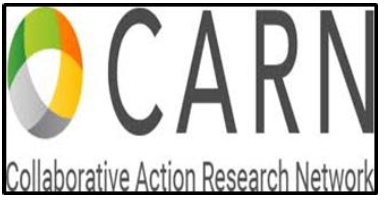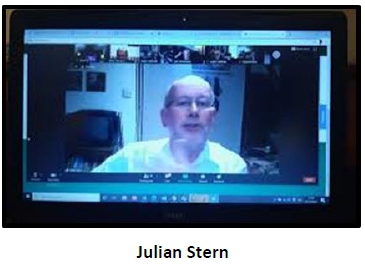Serviços Personalizados
Artigo
Indicadores
Links relacionados
-
 Citado por Google
Citado por Google -
 Similares em Google
Similares em Google
Compartilhar
Educational Research for Social Change
versão On-line ISSN 2221-4070
Educ. res. soc. change vol.10 no.1 Port Elizabeth Abr. 2021
CONFERENCE REPORT
Raised Voices: A Virtual Conference Where Your Voice Is Welcome
Stef Esterhulzen
North-West University stef.esterhuizen@nwu.ac.za
CARN Virtual Conference 24-25 October 2020

The Collaborative Action Research Network (CARN) aims to encourage and support personal, local, national, and international action research, action research projects, and contributions to the theory and methodology of action research (CARN, 2020). Although CARN had to cancel their planned face-to-face conference for 2020 due to Covid-19, they recreated it in the form of an online event. The conference was held on two separate days to enable colleagues from all over the world and from various time zones to participate. The session on 24 October was from 08:45 to 12:30 (BST) for colleagues from Asia and Australasia and on 25 October from 16:45 to 20:30 (BST) to suit colleagues from the Americas (CARN, 2020).
One hundred and seventy three delegates from 32 countries attended the conference over the two days (C. Wilby, personal communication February 4, 2021). The conference comprised a number of theoretical and practical presentations that explored action research. Fifteen conference workshops/symposiums were presented over the two days, and 40 individual and group papers were presented.
Raised Voices, the theme of the conference, sought to unite researchers from education, community work, and health and well-being to focus on the action dimensions of research and key issues that underpin our actions. Julian Stern, Professor of Education and Religion at the Bishop Grosseteste University, Lincoln, acted as keynote speaker on both days.

In his paper, "Conversation as Method: Get Rich Quick," he focused on conversation as method, which he drew from his research with children and adults by using conversation as a means of generating rich insights (Stern, 2020). Stern proposed conversation as an important method for researchers concerned with power, participation, and the personal in research. Conversation as a research method was portrayed as a means of generating rich insights rapidly.
The conference gave a platform to researchers to promote educational research for social change. It was evident in various papers presented, that active involvement with practitioners and participants was at the fore, and that practitioners actively contributed to the generation of knowledge and theory. Some of the papers on different approaches to action research are highlighted below.
The presentation by Lesley Wood, "Capacity Building for Participatory Action Research: Challenges and Rewards?" highlighted findings from the collaboration of community partners and academics from six South African universities who researched and developed a short learning programme on community-based research, which required critical inquiry into past, current, and future practices of action research.
"Looking Back to Look Ahead: Collaboratively Exploring the Journey Towards Professional Identity in Student Teachers," presented by Carolina Botha, looked at student teachers' perceptions of the teaching profession as developed by their own schoolteachers. She recommended that tertiary institutions adopt a participatory action research approach in dealing with student teachers' view of the teaching profession and create a space for active involvement between teacher educators and student teachers on their quest towards an ethical and caring professional identity.
The paper, "An Action Research Study Conducted by Domestic Workers," presented by Nanditta Bhatt from the Martha Farrell Foundation, reported on community development to promote collective action for social justice. Domestic workers in India documented their experiences of sexual harassment and exploitation through an arts-based action research project and reported their dependence on their employers due to their vulnerability to sexual abuse and exploitation. This group of domestic workers and their art project were responsible for the implementation of a new law in India.
"Novice vs. Expert: Facilitation Challenges Encountered When Using Participatory Action Learning and Action Research (PALAR)," a paper delivered by Mariëtte Koen, Marinda Neethling, Benita Taylor, and Stef Esterhuizen reflected on researchers' challenges when facilitating PALAR. They came to the conclusion that there were various facilitation challenges when endorsing Rogers' (1957) idea of using facilitation to sense participants' private world as if it were their own, without losing the "as if" quality.
It is evident that the papers presented at the conference aimed to bring change inside, as well as outside institutional spaces and communities. The paper delivered by Jackie Delong, Elizabeth Campbell, and Jack Whitehead from the University of Prince Edward Island, "Improving Our World by Raising the Voices of Action Researchers Through Living-Educational-Theories," reported on how educational influences in their own learning, the learning of others, and in the learning of social formations have emerged through supporting global practitioner-researchers and contributed to human flourishing.
"Student and Film During Covid-19: A Collaborative Journey Through Digital Storytelling," a paper delivered by Elma Marais and Carolina Botha highlighted the importance of reflective practice in the higher education sector when lecturers from South African universities were forced to reconceptualise their teaching and learning practices to save the 2020 academic year due to Covid-19.
The other papers presented covered a wide range of genres of action research, from living theory self-study approaches to full-blown community-based research-all aimed at bringing about social and educational change in various contexts.
Conclusion
It is clear that the conference promoted educational research for social change by staying true to CARN's mission to be committed to support and improve the quality of professional practice through systematic, critical, and creative inquiry into the goals, processes, and contexts of collaborative action research.
References
Collaborative Action Research Network. (2020). CARN Virtual Conference. https://www.carn.org.uk/
Rogers, C. (1957). The necessary and sufficient conditions of therapeutic personality change. Journal of Consulting Psychology, 21(2), 95-103. [ Links ]














